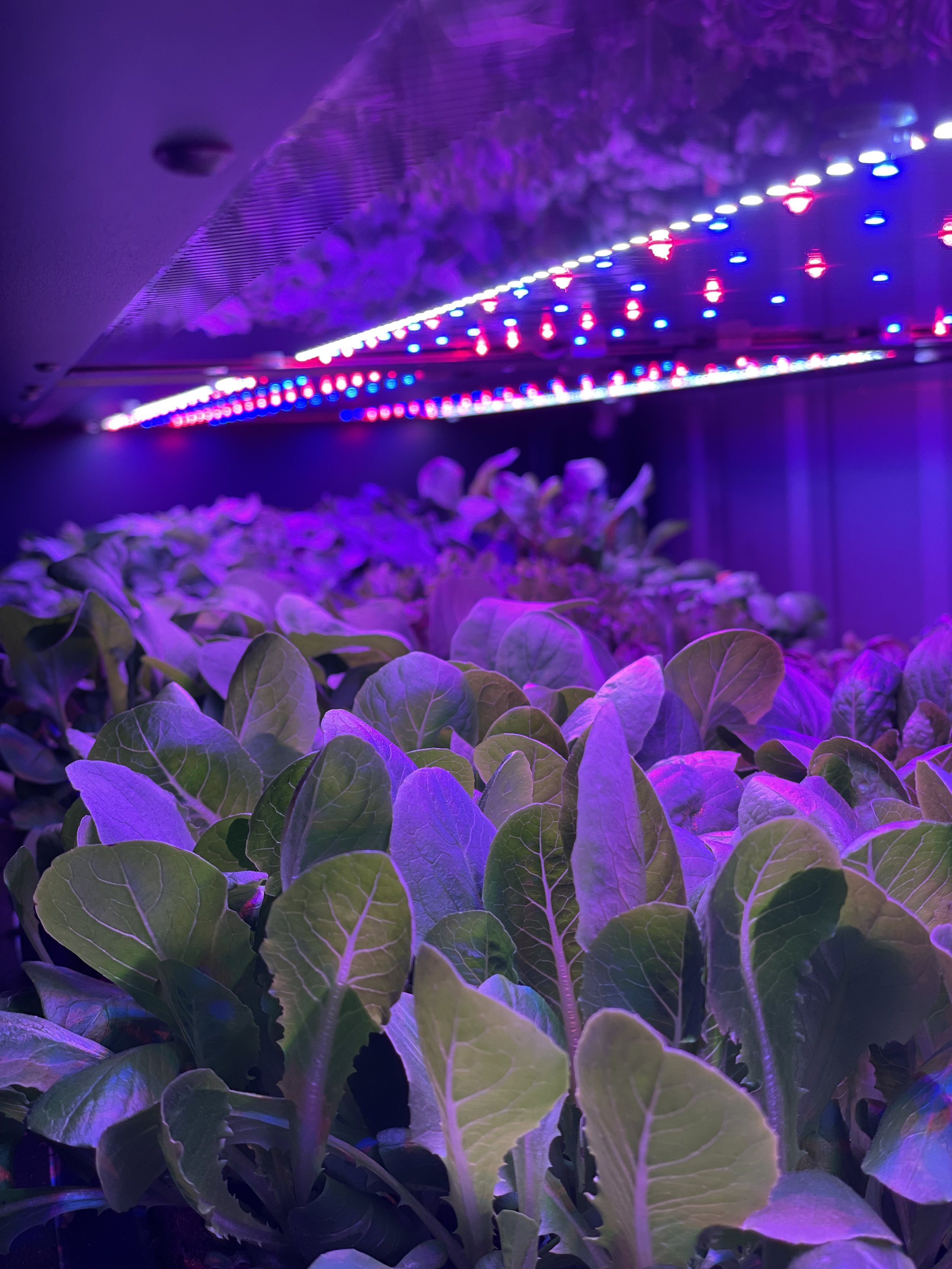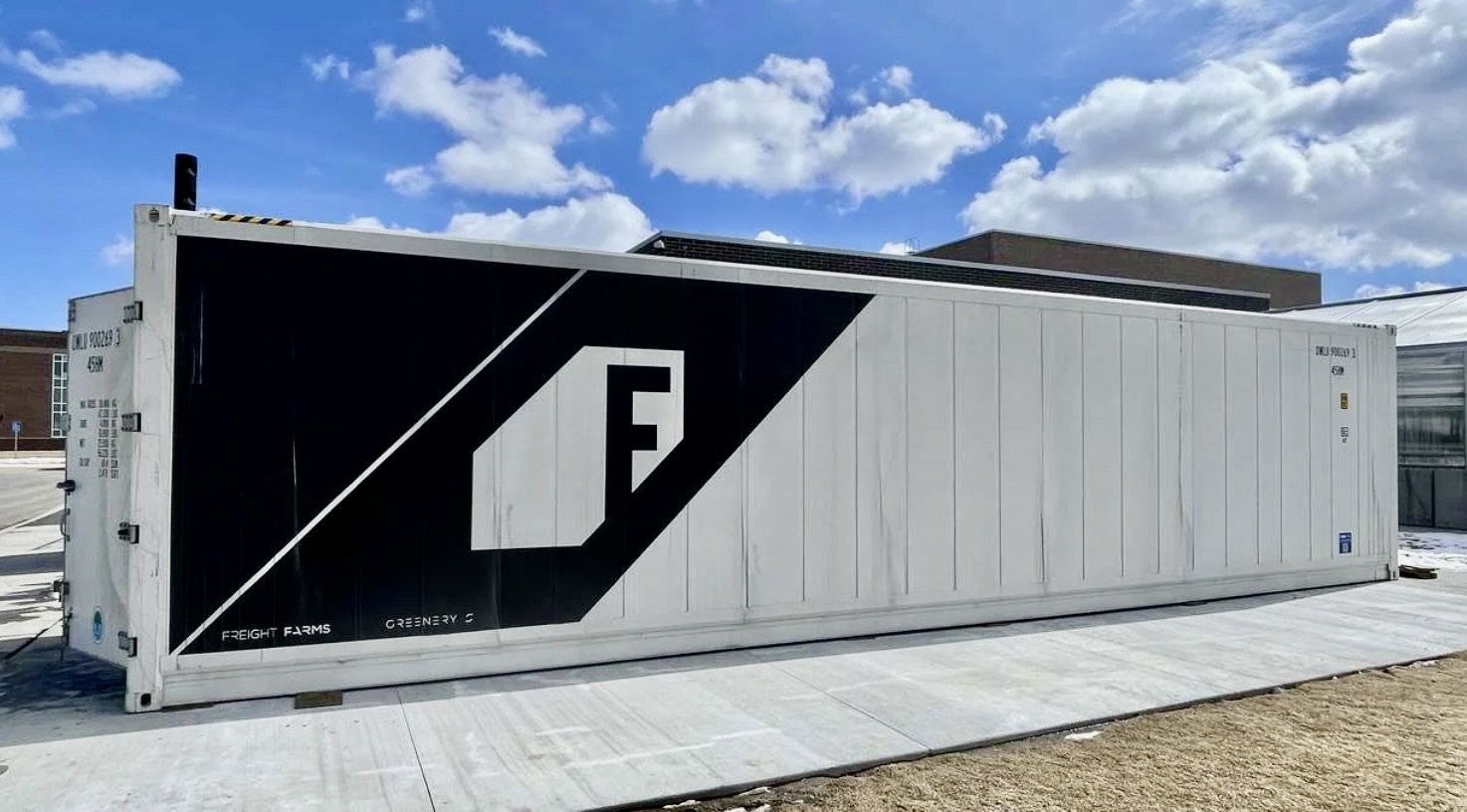
News About Farming in Shipping Containers & Limited Indoor Spaces
This Salad Concept Grows its Own Lettuce Through an On-Site Hydroponic Farm
While farm to table restaurants are nothing new, not many operators source their own salad greens from right next door. Neon Greens is a newly opened quick-service salad restaurant in St. Louis, Mo., that operates its own 400-square-foot vertical hydroponic farm attached to the restaurant storefront.
The farm yields yield roughly three acres each of 80 different lettuces, all of which Neon Greens uses in its salads, from mizuna lettuce to sweet crisp lettuce.
The two hydroponic farms are in an ancillary room attached to the restaurant, and an elevated conveyor belt delivers the lettuce next door once it is harvested.
How Farm in the City is Transforming Puerto Rico's Food System
Puerto Rico imports nearly 85% of its food, leaving its food system vulnerable to disruptions like hurricanes, supply chain issues, and economic instability. Farm in the City Nowis tackling this challenge with a novel approach to agriculture franchising, building a network of container farms powered by sustainable, accessible technology. By blending modern farming techniques with local empowerment, FITC’s model isn’t just about growing food—it’s about fostering resilient communities and creating new economic opportunities across the island.
Farm in the City Now reimagines food production as a franchise system, where small-scale container farms are owned and operated by farmers and local entrepreneurs, yet supported by a cohesive network of resources, training, and technology.
This model, rooted in principles of sustainability and resilience, is a transformative solution that makes agriculture both profitable and accessible for local communities.
JJ’s Star Spangled Salute: A Navy Veteran Creates a Container Farm
Today, we salute Navy Veteran Brad Fourby. Brad had a dream and moved nearly 2000 miles away from Sacramento to Pittsburg, Kansas, to make the dream come true.
That dream is “Leafy Green Farms.” Using his military training helped keep Brad methodical in his approach to his dream, saying, “I knew I didn’t need to win the war today; I just needed to survive the battle.”
He planted his first seed on July 4, 2021. What he created inside a shipping container was vertical rows of produce in a hydroponic growing environment that now serves area food deserts as well as 10 different farm classrooms and school districts to inspire future farmers.
Overbeck Controlled Environment Agriculture Facility
This spring, two shipping containers designed to be vertical farms were delivered to Purdue University to offer students, staff, faculty and the community to learn and experiment with new horticulture and agricultural practices.
"The student farm is all about offering our students experiences in many different angles to production. So, the Overbeck Controlled Environment Agriculture Facility project was a great fit. We are excited to educate our students how to operate a container farm. With many students excited by new technology, we have seen great interest in these container farms and the learning opportunities they can provide."
USA: Urban Hydroponic Farm Debuts in Chelsea, Massachusetts
A new hydroponic freight farm opened in Chelsea on Saturday, providing fresh produce year-round. The urban farm was launched by GreenRoots, a local environmental organization.
Roseann Bongiovanni, executive director of GreenRoots Teaching Kitchen, said the farm's hydroponic technology will let the organization grow produce year-round. “It’s a sort of urban farm-to-table concept to address food insecurity, nutrition, health, and also to build community and culture,” Bongiovanni said.
On the outside, the farm just looks like a storage container in a parking lot. But inside the container, water and artificial light and heat create an environment for plants to grow no matter the weather outside.
VIDEO: What If We Built Vertical Farms?
As our population grows, we're going to need a lot more farms to feed the planet. Yet, in a lot of places, farming is almost impossible. And much of the land we can use for farming is disappearing.
With so many farms on land, could we build farms vertically to save space? Maybe it’s time to grow ... up?
Where do we need vertical farms?
What would it take to build them?
How could they help to save the planet?
USA - WYOMING: CWC's Container Farm Arrived at Lander Center
“We are excited to have new technology on campus so our students can learn about these alternative high-tech farming practices,” says President of Central Wyoming College. “It is cutting edge and has major implications for substantially increasing food production in small spaces, and for bringing fresh foods to food deserts that have little or no access to these healthy and fresh food options.”
CWC’s AAS Degree in Regenerative Small Scale Farming is the first of its kind in Wyoming. Central Wyoming College also offers a Bachelor of Applied Science degree in Organizational Management and Leadership with an option in Agricultural Leadership.
From Hydroponics to Climate Control: The Technology Powering Container Farms
Freight Farms’ Greenery™ integrated several advanced systems to create an optimal growing environment:
Hydroponics: Plants are grown in a nutrient-rich, water-based system that recirculates water, reducing waste and maximizing resource efficiency.
LED Lighting: Adjustable LED lights simulate natural sunlight, providing plants with the ideal light spectrum for growth.
Climate Control: Advanced sensors regulate temperature, humidity, and CO2 levels, ensuring stable conditions year-round.
Automation and Sensors: Integrated automation monitors and adjusts farm conditions in real-time, reducing manual labor and optimizing farm performance.
VIDEO: Central Wyoming College’s Lander Campus Transformed With New Freight Farm
Lander, Wyo. — Central Wyoming College’s Freight Farm arrived yesterday at the Lander Center. The 40-foot shipping container is a fully automated hydroponic, year-round growing system, and is capable of producing two to four acres of produce a year.
“This will enhance the Central Wyoming College student experience,” says Ethan Page, Instructor of Local Food and Agriculture. “We will now be able to eliminate seasonal and logistical barriers and grow food at the Lander Center 365 days a year. We operate a student farm and a farm incubator program at the Alpine Science Institute in Sinks Canyon We will now be able to offer fresh veggies at local farmers’ markets throughout the year.”
VIDEO: MACC Farm Celebrates Southern California's First Freight Farm in K-12 Education
This 40-foot shipping container grows lettuce hydroponically, giving our students hands-on experience with agricultural technology that shapes the future of farming; it's a living classroom where students learn about sustainable agriculture, environmental stewardship, and the importance of regenerative farming.
By integrating this farm into our school campus, we’re fostering a deeper connection between students and nature while addressing food security in an urban setting.
A special thank you to Orange County Supervisor Doug Chaffee for his generous financial support, the AUHSD Board of Trustees, and AUHSD Business Services for overseeing the construction with dedication.
Together, we’re cultivating change—one seed, one student, and one meal at a time.
USA - South Dakota - Brookings Embraces Soil-Free Farming
Growing food without soil has been increasingly popular nationwide in recent years.
Hydroponics is the technique of growing plants using water as a nutrient solution and a growing medium instead of soil. Sustainable production methods like hydroponics and aquaponics can help produce food in various ways, including year-round production, increased space efficiency, and decreased waste while using up to 90% less water than traditional agriculture.
It isn’t new for the Brookings community to start experiencing places like South Dakota State University’s College of Agriculture, Food and Environmental Sciences (CAFES) and SoDak Greens.
USA - Kansas -Video: Pittsburg Container Farm Feeds Students, Community Members
Pittsburg High School is on a mission to get its students to be more health-conscious about their meal choices.
The idea is so important that they decided to have a hydroponic container farm on school grounds.
Improving Patient Health With Hospital-Based Farming
Hospital-based farming is an innovative approach that integrates agricultural practices within healthcare settings to improve patient outcomes. Hospitals can enhance patient recovery, reduce food insecurity, and promote overall well-being by providing fresh, nutritious food directly from on-site farms.
This blog, supported by recent research, explores the benefits of hospital-based farming and offers practical insights for hospitals and healthcare systems looking to implement such initiatives.
VIDEO: What is the Freight Farm
A Freight Farm is not your traditional farm; it's a cutting-edge, self-contained ecosystem housed within a repurposed shipping container. Inside these compact and versatile structures, we harness the power of hydroponics and vertical farming to grow fresh, nutritious produce year-round, regardless of climate or location. From leafy greens and herbs to fruits and vegetables, Freight Farms empowers individuals, communities, and businesses to cultivate a sustainable future while minimizing environmental impact.
The Board of Directors of Freight Farms Has Unanimously Appointed Brad Griffith, Former CCO of Compass Minerals and 23-year Agri-Food Veteran, as Chief Executive Officer
As a global Life Sciences executive and strategic advisor with a passion for sustainable Agri-Food systems, Brad has accelerated startups and turnarounds, transformed commercial and manufacturing operations, and grown multibillion-dollar P&Ls.
Previously as Chief Commercial Officer at Kansas-based Compass Minerals, Brad led the global commercial Plant Nutrition and Salt businesses, global supply chain, and global R&D. Prior to Compass Minerals, Brad spent over 17 years with Monsanto Company in agriculture and pharmaceuticals. Brad is also an Operating Partner at Ajax Strategies and Skyline Global Partners, and he is an Independent Board Director for Midwestern BioAg.
Our Stories: What’s In The Box? It Might Be The Future of Urban Farming
Down a narrow path in the middle of Governors Island sits an 8-foot-by-40-foot shipping container on the grass. Inside, you won’t find cargo that belongs in a retail warehouse or cars fresh from the factory. Nope, this container holds something potentially far more valuable: The future of urban farming.
Step inside and you’ll find a series of parallel movable walls—almost as if they’re hung on curtain rods—with columns of floor-to-ceiling sponges. Tucked into the sponges are shoots of kale sprouting every few inches.
“This is part of our commitment to creating the clean energy future,” says Bill Fairechio, a department manager in Con Edison’s Research and Development department.
Chicago’s First Youth-Led Container Farm Helps Combat Food Deserts on the South Side
The program was launched in March in partnership with the By the Hand Club and Kenilworth Union Church. The hydroponic container farm operates in any climate and without the use of harsh chemicals. So far, it’s produced eight harvests.
"When we have a full container, we’re looking at about 4,000 heads of lettuce that we’re currently growing," said Joe Jones, senior director of entrepreneurship at Bowen Harvest. "The cycle is about 4,000 and that equates to about four acres a year."
Anna Jaques Hospital Says Haverhill YMCA Freight Farm Helps Overcome ‘Food Deserts’
The first birthday of Haverhill YMCA’s Freight Farm brought out staff, city officials and its primary sponsor for a birthday cake and, of course, salad made with the farm’s own lettuce.
Celebrating Wednesday at the Gateway Academy on Primrose Street, where the first YMCA Freight Farm in the country is located, were Mayor Melinda E. Barrett, YMCA Regional Executive Director Tracy Fuller, city councilors, community leaders and Glenn D. Focht, president of Anna Jaques Hospital, which sponsored the farm.



















